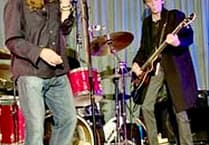Mary and Dai Harries, of Ross-on-Wye, have been fostering autumn hoglets for over ten years.
It all started when they found an autumn baby in their garden and took it to their neighbour, Maureen Webb. Maureen was already looking after 20 autumn born hoglets at the time, and was unable to hold anymore, so Mary started to foster the hoglet herself.
Now, Mary and Dai look after three to four autumn born hoglets every year, finding them in and around their garden. The hoglets wouldn’t survive the winter if it wasn’t for the couple putting them in warm, dry shelters with food.
In the wild, hedgehogs eat slugs, snails, beetles and sometimes fruit. When they are fostered, they are fed hedgehog feed pellets, along with the occasional raisin, nut, banana chip or dried meal worm.
When Mary finds an autumn hoglet, she takes it to Maureen, who gets them wormed and weighed. Mary then puts the hedgehog in an insulated shelter and feeds them. Over the winter, Mary steadily increases their portion sizes and checks on them regularly, until the weather gets warmer and they are ready to be let out.
Hedgehogs are not pets. Mary explained that to foster them takes a lot of time and care; their shelters need to be cleaned once a day, and their food and vet bills are not cheap. They should not be handled regularly, as they are wild animals, and once they are ready, they must be set free.
Hedgehogs have long been Ross’ town symbol, and the annual Ross-on-Wye Hedgehog Festival is currently running, with lots of hedgehog related events to take part in. To find out more about these events, visit the ‘Hedgehog Festival in Ross-on-Wye’ Facebook page.
Mary told the Ross Gazette: “The hedgehog is important to Ross, and with their numbers decreasing, they are definitely worth looking after.”
If you are considering fostering Hedgehogs, Mary recommends reading the leaflets from the British Hedgehog Preservation society, along with the detailed book ‘Hedgehog’ by Hugh Warwick, and by also talking to people who already foster hoglets.




